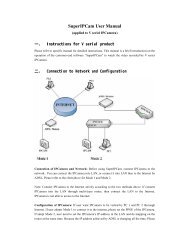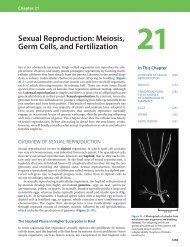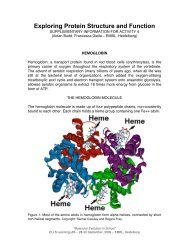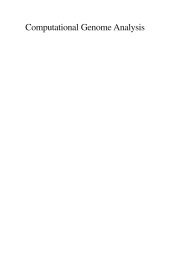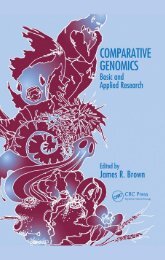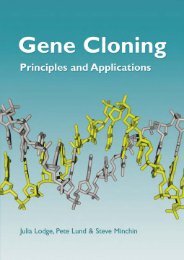- Page 1 and 2:
PART 1. Principles of development i
- Page 3 and 4:
PART 2: Early embryonic development
- Page 5 and 6:
15. Lateral plate mesoderm and endo
- Page 7 and 8:
Hox Genes: Descent with Modificatio
- Page 9 and 10:
The question of growth. How do our
- Page 11 and 12:
Embryonic homologies One of the mos
- Page 13 and 14:
absent (Figure 1.16A). Over 7000 af
- Page 15 and 16:
Such growth, in which the shape is
- Page 17 and 18:
One way to search for the chemicals
- Page 19 and 20:
2 3 hours as adults, and they must
- Page 21 and 22: for the following spring's breeding
- Page 23 and 24: VADE MECUM Amphibian development. T
- Page 25 and 26: The formation of a cap is a complex
- Page 27 and 28: In Chlamydomonas, recognition occur
- Page 29 and 30: organism with two distinct and inte
- Page 31 and 32: Aggregation is initiated as each of
- Page 33 and 34: The mathematics of such oscillation
- Page 35 and 36: gonidia to undergo a modified patte
- Page 37 and 38: Sponges develop in a manner so diff
- Page 39 and 40: Embryology provides an endless asso
- Page 41 and 42: Environmental sex determination Sex
- Page 43 and 44: Protection of the egg by sunscreens
- Page 45 and 46: The Developmental Mechanics of Cell
- Page 47 and 48: Autonomous specification was first
- Page 49 and 50: In postulating this model, Weismann
- Page 51 and 52: Insofar as it contains a nucleus, e
- Page 53 and 54: Other tissues may use the same grad
- Page 55 and 56: will give rise to its particular or
- Page 57 and 58: Sydney Brenner (quoted in Wilkins 1
- Page 59 and 60: The results of their experiments we
- Page 61 and 62: This observation led Steinberg to p
- Page 63 and 64: into a single layer of cells (Takei
- Page 65 and 66: 6. In conditional specification, th
- Page 67 and 68: 3. Geneticists had to explain pheno
- Page 69 and 70: These events are not the normal rou
- Page 71: differentiated; each of them contai
- Page 75 and 76: ecombinase enzymes are active only
- Page 77 and 78: In situ hybridization But where was
- Page 79 and 80: damaged.) The second primer is adde
- Page 81 and 82: By using the appropriate restrictio
- Page 83 and 84: These homozygous mutant mice lacked
- Page 85 and 86: Phenotype Manipulation This technol
- Page 87 and 88: The second approach is candidate ge
- Page 89 and 90: developmental genetics is different
- Page 91 and 92: This gene consists of the following
- Page 93 and 94: In addition to these basal transcri
- Page 95 and 96: Enhancers are critical in the regul
- Page 97 and 98: The third functional region of MITF
- Page 99 and 100: A fourth enhancer sequence, located
- Page 101 and 102: The discovery of the human globin L
- Page 103 and 104: The results of this procedure are o
- Page 105 and 106: In vertebrates, the presence of met
- Page 107 and 108: chromatin that remains condensed th
- Page 109 and 110: Second, knocking out one Xist locus
- Page 111 and 112: types of cells (Kleene and Humphrey
- Page 113 and 114: (Sxl) gene,* while the autosomes pr
- Page 115 and 116: Table 5.3. Some mRNAs stored in ooc
- Page 117 and 118: determine the anterior-posterior ax
- Page 119 and 120: 6. Cell-cell communication in devel
- Page 121 and 122: The inducing tissue does not need i
- Page 123 and 124:
Instructive and permissive interact
- Page 125 and 126:
mouth, whereas the frog tadpole pro
- Page 127 and 128:
are utilized throughout the animal
- Page 129 and 130:
includes the TGF-β family, the act
- Page 131 and 132:
The RTK spans the cell membrane, an
- Page 133 and 134:
members of this family: the C. eleg
- Page 135 and 136:
The Wnt pathway Members of the Wnt
- Page 137 and 138:
The Hedgehog pathway is extremely i
- Page 139 and 140:
A series of mutations has been foun
- Page 141 and 142:
The Nature of Human Syndromes As we
- Page 143 and 144:
vertebral column deformities, myopi
- Page 145 and 146:
The mammalian homologue of CED-4 is
- Page 147 and 148:
In the absence of Notch gene transc
- Page 149 and 150:
extracellular matrix (Figure 6.32).
- Page 151 and 152:
mammary gland tissue. The binding o
- Page 153 and 154:
In some cells, gene transcription r
- Page 155 and 156:
PARTE 2. Early embryonic developmen
- Page 157 and 158:
The means by which sperm are propel
- Page 159 and 160:
The sperm released during ejaculati
- Page 161 and 162:
Lying immediately beneath the plasm
- Page 163 and 164:
The mechanisms of chemotaxis differ
- Page 165 and 166:
Once the sea urchin sperm has penet
- Page 167 and 168:
Removal of these threonine- or seri
- Page 169 and 170:
undergo the acrosomal reaction with
- Page 171 and 172:
Gamete Fusion and the Prevention of
- Page 173 and 174:
The fast block to polyspermy. The f
- Page 175 and 176:
envelope to expand and become the f
- Page 177 and 178:
The calcium ions responsible for th
- Page 179 and 180:
Thus, the conversion of NAD + to NA
- Page 181 and 182:
eticulum (McPherson et al. 1992). T
- Page 183 and 184:
cAMP-dependent protein kinase activ
- Page 185 and 186:
These cells divide to form embryos
- Page 187 and 188:
(Figure 7.34; Elinson and Rowning 1
- Page 189 and 190:
6. In many species, eggs secrete di
- Page 191 and 192:
One consequence of this rapid cell
- Page 193 and 194:
Table 8.1. Karyokinesis and cytokin
- Page 195 and 196:
provides a classification of cleava
- Page 197 and 198:
This occurred at precisely the time
- Page 199 and 200:
These rapid and invariant cell clea
- Page 201 and 202:
The identities of the signaling mol
- Page 203 and 204:
Ingression of primary mesenchyme Fu
- Page 205 and 206:
But these guidance cues cannot be s
- Page 207 and 208:
lastocoel wall (Dan and Okazaki 195
- Page 209 and 210:
The orientation of the cleavage pla
- Page 211 and 212:
stage, the remaining cells divide n
- Page 213 and 214:
embryos can produce these cells, bu
- Page 215 and 216:
Early Development in Tunicates Tuni
- Page 217 and 218:
(or inactivating) specific genes. T
- Page 219 and 220:
occur under laboratory conditions.
- Page 221 and 222:
the germ cells. Using fluorescent a
- Page 223 and 224:
Conditional specification As we saw
- Page 225 and 226:
eggs. Coda This chapter has describ
- Page 227 and 228:
9. The genetics of axis specificati
- Page 229 and 230:
Following cycle 13, the oocyte plas
- Page 231 and 232:
Thus, at the end of germ band forma
- Page 233 and 234:
Classic embryological experiments d
- Page 235 and 236:
posterior region of the unfertilize
- Page 237 and 238:
Further studies have strengthened t
- Page 239 and 240:
The Hunchback protein also works wi
- Page 241 and 242:
transcription factor to activate an
- Page 243 and 244:
The gap genes The gap genes were or
- Page 245 and 246:
Table 9.2. Major genes affecting se
- Page 247 and 248:
The development of the normal patte
- Page 249 and 250:
However, the mechanism by which the
- Page 251 and 252:
As we saw above, the gap gene and p
- Page 253 and 254:
can substitute for Ultrabithorax an
- Page 255 and 256:
The Translocation of Dorsal Protein
- Page 257 and 258:
The Gurken signal is received by th
- Page 259 and 260:
This fate map is generated by the g
- Page 261 and 262:
first glimpses of the multiple leve
- Page 263 and 264:
10. Early development and axis form
- Page 265 and 266:
While these cells are dividing, num
- Page 267 and 268:
The next phase of gastrulation invo
- Page 269 and 270:
Black and Gerhart (1985, 1986) let
- Page 271 and 272:
The convergent extension of the dor
- Page 273 and 274:
During early gastrulation, three ro
- Page 275 and 276:
Spemann concluded from this experim
- Page 277 and 278:
Hans Spemann and Hilde Mangold: Pri
- Page 279 and 280:
We will take up each of these quest
- Page 281 and 282:
Moreover, the injection of exogenou
- Page 283 and 284:
These Nodal-related proteins will a
- Page 285 and 286:
The diffusible proteins of the orga
- Page 287 and 288:
Follistatin. The fourth organizer-s
- Page 289 and 290:
Frzb and Dickkopf. Shortly after th
- Page 291 and 292:
Moreover, when dorsal blastopore li
- Page 293 and 294:
The relationship between these thre
- Page 295 and 296:
Nodal protein activates expression
- Page 297 and 298:
11. The early development of verteb
- Page 299 and 300:
Gastrulation in Fish Embryos The fi
- Page 301 and 302:
If one conceptually opens a Xenopus
- Page 303 and 304:
Left-right axis formation Little is
- Page 305 and 306:
thereby forming the secondary hypob
- Page 307 and 308:
This region, the germinal crescent,
- Page 309 and 310:
Axis Formation in the Chick Embryo
- Page 311 and 312:
The mechanisms for neural induction
- Page 313 and 314:
*Arendt and Nübler-Jung (1999) hav
- Page 315 and 316:
Compaction The fifth, and perhaps t
- Page 317 and 318:
Modifications for development withi
- Page 319 and 320:
The ectodermal precursors end up an
- Page 321 and 322:
These include the genes for transcr
- Page 323 and 324:
Experimental analysis of the hox co
- Page 325 and 326:
Kessel and Gruss (1991) found this
- Page 327 and 328:
Mice homozygous for an insertion mu
- Page 329 and 330:
7. In birds, gravity is critical in
- Page 331 and 332:
This tissue forms the amnionic sac
- Page 333 and 334:
12. The central nervous system and
- Page 335 and 336:
surrounding them. As much as 50% of
- Page 337 and 338:
Cell wedging is intimately linked t
- Page 339 and 340:
Fig 12.6 Human neural tube closure
- Page 341 and 342:
The anterior-posterior axis The ear
- Page 343 and 344:
Ventral patterning of the neural tu
- Page 345 and 346:
The time of this vertical division
- Page 347 and 348:
layer (Wallace 1999). Each Purkinje
- Page 349 and 350:
However, if these cells are transpl
- Page 351 and 352:
Neuronal Types The human brain cons
- Page 353 and 354:
Neurons transmit electrical impulse
- Page 355 and 356:
Development of the Vertebrate Eye A
- Page 357 and 358:
In addition, there are numerous Mü
- Page 359 and 360:
are shed and are replaced by new ce
- Page 361 and 362:
Just as there is a pluripotent neur
- Page 363 and 364:
13. Neural crest cells and axonal s
- Page 365 and 366:
The Trunk Neural Crest Migration pa
- Page 367 and 368:
Recognition of surrounding extracel
- Page 369 and 370:
However, D. J. Anderson's laborator
- Page 371 and 372:
Neural crest cells from rhombomeres
- Page 373 and 374:
the aortic arch arteries and the se
- Page 375 and 376:
Soon afterward, the expression patt
- Page 377 and 378:
Ericson and colleagues (1996) have
- Page 379 and 380:
That it must be a sort of a surface
- Page 381 and 382:
the G growth cone acts abnormally,
- Page 383 and 384:
Guidance by diffusible molecules Ne
- Page 385 and 386:
There is some reciprocity in scienc
- Page 387 and 388:
The activity of the synapse release
- Page 389 and 390:
Growth of the retinal ganglion axon
- Page 391 and 392:
The complicated nerve fiber circuit
- Page 393 and 394:
Snapshot Summary: Neural Crest Cell
- Page 395 and 396:
Fetal Neurons in Adult Hosts In 197
- Page 397 and 398:
Somites give rise to the cells that
- Page 399 and 400:
Eph signaling is thought to mediate
- Page 401 and 402:
(The dermis of other areas of the b
- Page 403 and 404:
Muscle cell fusion The myotome cell
- Page 405 and 406:
The mechanism of intramembranous os
- Page 407 and 408:
mitochondrial energy potential (Sha
- Page 409 and 410:
Mutations in FGFR1 can cause Pfeiff
- Page 411 and 412:
These buds eventually separate from
- Page 413 and 414:
Step 2: The metanephrogenic mesench
- Page 415 and 416:
Step 5: Conversion of the aggregate
- Page 417 and 418:
6. The two myotome regions are spec
- Page 419 and 420:
The Heart The circulatory system is
- Page 421 and 422:
This fusion occurs at about 29 hour
- Page 423 and 424:
Formation of Blood Vessels Although
- Page 425 and 426:
networks of each organ arise within
- Page 427 and 428:
In some instances, angiogenesis may
- Page 429 and 430:
This became apparent when experimen
- Page 431 and 432:
Blood and lymphocyte lineages. Figu
- Page 433 and 434:
Chick cells are readily distinguish
- Page 435 and 436:
In mammalian embryos, food and oxyg
- Page 437 and 438:
*In some infants, the septa fail to
- Page 439 and 440:
As Figure 15.27 shows, the stomach
- Page 441 and 442:
The surfactant enables the alveolar
- Page 443 and 444:
In mammals, the size of the allanto
- Page 445 and 446:
inhibits liver formation (Figure 15
- Page 447 and 448:
Moreover, as will be detailed in Ch
- Page 449 and 450:
These cells secrete the paracrine f
- Page 451 and 452:
Induction of the apical ectodermal
- Page 453 and 454:
The progress zone: The mesodermal c
- Page 455 and 456:
The mechanism by which Hox genes co
- Page 457 and 458:
Thus, while the Hox gene expression
- Page 459 and 460:
Charité and colleagues (1994) have
- Page 461 and 462:
Between the time when the cell's de
- Page 463 and 464:
Snapshot Summary: The Tetrapod Limb
- Page 465 and 466:
This environmental view of sex dete
- Page 467 and 468:
The cells of the seminiferous tubul
- Page 469 and 470:
into the mesenchyme, but stay near
- Page 471 and 472:
There was a strict correlation betw
- Page 473 and 474:
Wnt4: a potential ovary-determining
- Page 475 and 476:
Anti-müllerian duct hormone Anti-M
- Page 477 and 478:
in another (see Jacklin 1981; Bleie
- Page 479 and 480:
Chromosomal Sex Determination in Dr
- Page 481 and 482:
The sex-lethal gene as the pivot fo
- Page 483 and 484:
Doublesex: The switch gene of sex d
- Page 485 and 486:
It is not known whether the tempera
- Page 487 and 488:
18. Metamorphosis, regeneration, an
- Page 489 and 490:
There are no ipsilateral (same-side
- Page 491 and 492:
Organ-specific response to thyroid
- Page 493 and 494:
The more T 3 receptors a tissue has
- Page 495 and 496:
Other species, such as A. tigrinum,
- Page 497 and 498:
Metamorphosis in Insects Types of i
- Page 499 and 500:
On one side of the sac, the epithel
- Page 501 and 502:
During the first larval instar, the
- Page 503 and 504:
central region producing the Wingle
- Page 505 and 506:
The molecular biology of hydroxyecd
- Page 507 and 508:
Since its discovery in 1954, when B
- Page 509 and 510:
How do they regain the ability to d
- Page 511 and 512:
It is probable that during normal r
- Page 513 and 514:
The head activator gradient. The ab
- Page 515 and 516:
*The tradition of leaving one's boo
- Page 517 and 518:
However, recent studies have indica
- Page 519 and 520:
Moreover, if a mutation occured in
- Page 521 and 522:
Snapshot Summary: Metamorphosis, Re
- Page 523 and 524:
19. The saga of the germ line We be
- Page 525 and 526:
In the nematode C. elegans, the ger
- Page 527 and 528:
When ultraviolet light is applied t
- Page 529 and 530:
Fibronectin is likely to be an impo
- Page 531 and 532:
Germ cell migration in birds and re
- Page 533 and 534:
EG Cells, ES Cells, and Teratocarci
- Page 535 and 536:
come together and are then separate
- Page 537 and 538:
The distal tip cell extends long fi
- Page 539 and 540:
The initiation of spermatogenesis d
- Page 541 and 542:
ecause the flagellum is beginning t
- Page 543 and 544:
A partial catalogue of the material
- Page 545 and 546:
When a specific 340-base sequence f
- Page 547 and 548:
Oocyte chromosomes can be incubated
- Page 549 and 550:
The structure of the meroistic ovar
- Page 551 and 552:
Periodically, a group of primordial
- Page 553 and 554:
Following ovulation, the luteal pha
- Page 555 and 556:
20. An overview of plant developmen
- Page 557 and 558:
oth the embryo and the mature sporo
- Page 559 and 560:
*A small weed in the mustard family
- Page 561 and 562:
should provide information on the e
- Page 563 and 564:
of hormones. In scarlet runner bean
- Page 565 and 566:
embryos demonstrate that isolated p
- Page 567 and 568:
When the shoot emerges from the soi
- Page 569 and 570:
etween nodes is called an internode
- Page 571 and 572:
flowering patterns among the over 3
- Page 573 and 574:
genes, class D genes are now being
- Page 575 and 576:
Table 21.1. Specific settlement sub
- Page 577 and 578:
Predictable Environmental Differenc
- Page 579 and 580:
Diapause Many species of insects ha
- Page 581 and 582:
The hindwing pigments of the short-
- Page 583 and 584:
Ferguson and Joanen (1982) speculat
- Page 585 and 586:
Predator-Induced Defenses One survi
- Page 587 and 588:
3. Antigens are presented (usually
- Page 589 and 590:
the ipsilateral eye. The situation
- Page 591 and 592:
*The importance of substrates for l
- Page 593 and 594:
Thus, most abnormal embryos are spo
- Page 595 and 596:
Retinoic acid as a teratogen In som
- Page 597 and 598:
Another pathway to apoptosis involv
- Page 599 and 600:
Whether heavy maternal alcohol cons
- Page 601 and 602:
Some scientists, however, say that
- Page 603 and 604:
Chains of causation Whether in law
- Page 605 and 606:
Snapshot Summary: The Environmental
- Page 607 and 608:
One could emphasize the common desc
- Page 609 and 610:
The search for the Urbilaterian anc
- Page 611 and 612:
Hox Genes: Descent with Modificatio
- Page 613 and 614:
Changes in Hox gene transcription p
- Page 615 and 616:
But within the crustacean lineages,
- Page 617 and 618:
Changes in Hox gene number The numb
- Page 619 and 620:
Homologous Pathways of Development
- Page 621 and 622:
The gradient of Dpp concentration f
- Page 623 and 624:
Modularity: The Prerequisite for Ev
- Page 625 and 626:
Such a trait would be selected for
- Page 627 and 628:
*The lack of such transitional form
- Page 629 and 630:
Coevolution of ligand and receptor
- Page 631 and 632:
Evidence for this mathematical mode
- Page 633 and 634:
It is difficult for a mutation to a
- Page 635 and 636:
The population genetics model conta
- Page 637 and 638:
However, once one adds development
- Page 639 and 640:
A partial list of genes active in h




